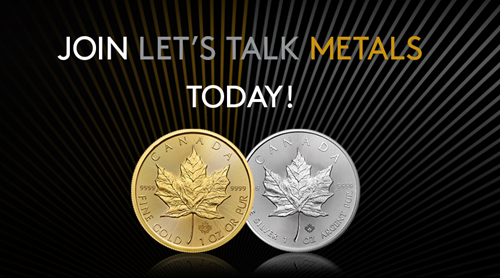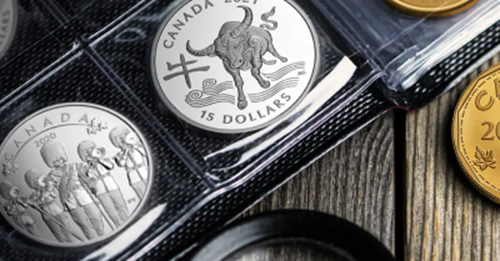Can I Buy Physical Bullion From a Canadian bank?
- Oct 24, 2024
- loveGOLD
- 5 minute read
The information contained in this article is current as of the date of publishing.
Investing in physical bullion involves many different choices. What kind of metal to buy? How much to buy? What format to buy: bars or coins? And where to buy it from? One option is to buy it from a bank. In this blog, we will look at what’s involved in buying bullion from your bank and explore some of the factors to consider when making your decision.
If you live in Canada, there’s a good chance you bank with one of Canada’s five largest financial institutions: BMO, CIBC, RBC, Scotiabank or TD Canada Trust. All except Scotiabank offer physical bullion to investors, but the options and rules governing the purchase of physical bullion differ among them. Below are a few things to know about investing in physical bullion with each of Canada’s “Big Five” banks.
The information below is based on publicly available information that is believed to be current at the time of publication of this blog. However, terms and conditions, and options, may change at any time, and some banks may offer additional options not listed here and as well may have additional applicable terms and conditions. As well, other banks and credit unions in Canada may have different offerings. If you’re thinking about investing in physical bullion through your financial institution, you should reach out to their investment department for more information.


The information contained in this article is current as of the date of publishing.
Investing in physical bullion involves many different choices. What kind of metal to buy? How much to buy? What format to buy: bars or coins? And where to buy it from? One option is to buy it from a bank. In this blog, we will look at what’s involved in buying bullion from your bank and explore some of the factors to consider when making your decision.
If you live in Canada, there’s a good chance you bank with one of Canada’s five largest financial institutions: BMO, CIBC, RBC, Scotiabank or TD Canada Trust. All except Scotiabank offer physical bullion to investors, but the options and rules governing the purchase of physical bullion differ among them. Below are a few things to know about investing in physical bullion with each of Canada’s “Big Five” banks.
The information below is based on publicly available information that is believed to be current at the time of publication of this blog. However, terms and conditions, and options, may change at any time, and some banks may offer additional options not listed here and as well may have additional applicable terms and conditions. As well, other banks and credit unions in Canada may have different offerings. If you’re thinking about investing in physical bullion through your financial institution, you should reach out to their investment department for more information.
BUYING BULLION BARS AND COINS FROM YOUR BANK
- BMO: You can purchase physical gold and silver bullion from BMO by contacting a representative at BMO Nesbitt Burns, BMO InvestorLine or BMO Private Bank.[1],[2] Bullion purchases from BMO include storage at no extra charge, either in BMO’s vault at the Royal Canadian Mint (when buying gold)[3] or in an approved vault facility in Canada (when buying silver).[4] If you’d rather store it yourself, you can request physical delivery of your bullion.[5],[6]
- CIBC: You can purchase physical gold and silver bullion from CIBC by visiting a branch or by visiting CIBC’s precious metals website.[7] If you are a CIBC customer, you can also purchase directly through your online banking system.[8] Some bullion products may be sold back to CIBC, but the price may be higher or lower than what you paid originally.[9]
- RBC: RBC’s precious metals program currently includes gold and silver, available from any RBC branch.[10] You can also choose to purchase secure transportation or storage for your physical bullion products.[11]
- Scotiabank: As of early 2021, Scotiabank no longer offers any precious metal products or services.[12]
- TD Canada Trust: Gold, silver and platinum bars and coins are available through the TD Canada Trust website, its branches and TD Foreign Exchange Centres.[13] While you don’t need a TD account to buy physical bullion, the bank does offer preferred pricing to its customers.[14] If you are a TD customer, you can also have your bullion stored in a secure, fully insured vault.[15] You can sell your bullion products directly through TD’s storage program or by visiting a branch, with pricing based on current market values.[16]
ELEMENTS TO CONSIDER WHEN BUYING PHYSICAL BULLION FROM A BANK
There are a number of factors to consider when deciding whether or not to buy your physical bullion from a bank depending on your particular needs, some of those factors are as follows:
- Reliability and security: In Canada, all banks that sell physical bullion from the Royal Canadian Mint are authorized Bullion DNA™ dealers, meaning they offer a high level of security and guaranteed authenticity.
- Convenience: Canada’s Big Five banks have branches all over the country, so there’s often one not far from where you live or work. For added convenience, many banks let you buy your physical bullion online, then have it delivered right to your home or safely stored in their own secure vaults.[17],[18],[19],[20],[21]
- Product selection: While some banks offer a wide selection of physical bullion products, from fractional coins all the way up to full kilogram bars, others may carry a smaller selection, typically focusing on larger bars.[22] If you have something specific in mind, you’ll want to check with your bank to see if they carry it.
- Price premiums: While the familiarity and reliability of banks may offer psychological comfort, it often comes with higher price premiums than other bullion sources, especially for smaller coins.[23]
- Expertise of selling personnel: Customer-facing bank employees are generally not bullion specialists and may be less equipped to provide in-depth analysis and guidance on your purchase than a dealer who specializes in bullion.[24]
- Options for selling: If you choose to sell your physical bullion, you may be able to sell it directly back to the bank, although some banks reserve the right to refuse a sale for any reason.[25]
- Storage options: Given the high value of physical bullion, you might feel more comfortable storing it in a bank’s secure vaults, where it’s better protected from burglary or other incidents than it would be if you stored it in your own home.
MAKE THE RIGHT DECISION FOR YOU
While buying physical bullion from your bank offers a convenient, familiar experience, it’s only one option—and it may or may not be the right choice for you. There are also more than 40 authorized Bullion DNA dealers across Canada, as well as more than 100 around the world, that all offer a highly secure way to buy and sell physical bullion products from the Royal Canadian Mint.[26] As always, we encourage you to speak with your financial advisor before making any investment decisions.
Some links to websites and references to documents provided are available in English only and are owned or operated by third parties. By accessing a third-party website and/or document you understand that they are independent from the Royal Canadian Mint (the “Mint”) and that the Mint has no control over the content of such third-party websites and cannot assume any responsibility for materials created or published by such third-party websites. In addition, a link to a third-party’s website or document does not imply that the Mint endorses the website, the data, information and/or the content of such website. It is your responsibility to ensure that you review and agree to terms and conditions applicable to such websites before using it. Please note that the Mint is not responsible for webcasting or any other form of transmission received from any linked website.
The information provided herein is intended for informational purposes only and is not intended to constitute investment, financial, legal, tax or accounting advice, and you should not rely on the information herein for such advice. Past performance, and historical trends are not indicative of future results. Many factors unknown to the Mint may affect the applicability of any statement or comment made herein to your particular circumstances, and this information does not take into account any investment objectives, financial situation or particular needs of any particular person. You should directly consult your financial professional or other advisors before acting on any information herein. The information and materials herein are provided with the understanding that the Mint is not acting in a fiduciary capacity. Nothing contained herein constitutes a solicitation, recommendation or offer for the purchase or sale of products or services of any kind whatsoever. Diversification does not guarantee any investment returns and does not eliminate the risk of loss.
The information provided herein may contain forward-looking statements which are based on current expectations and are subject to change. Forward-looking statements involve significant known and unknown risks, uncertainties and assumptions. A number of factors could cause actual results, performance or achievements to be materially different from any future results, performance or achievements that may be expressed or implied by such forward-looking statements. These statements are not guarantees of future performance and should not be relied upon as such. The Mint assume no responsibility for updating any information, including forward-looking statements, contained herein.
Mint does not guarantee the accuracy or completeness of any information contained herein, nor does the Mint accept responsibility for any losses or damages arising directly or indirectly from the use of or reliance on this information.
Reproduction or redistribution of any of this information is expressly prohibited without the prior written consent of the Mint.
Any person accessing this information should also consult the Mint’s website Terms of Use | The Royal Canadian Mint.
[1] BMO, BMO’s Gold Deposit Program.
[2] BMO, BMO Vaulted Physical Silver Deposit Program.
[3] BMO, BMO’s Gold Deposit Program.
[4] BMO, BMO Vaulted Physical Silver Deposit Program.
[5] BMO, BMO’s Gold Deposit Program.
[6] BMO, BMO Vaulted Physical Silver Deposit Program.
[7] CIBC, CIBC Precious Metals.
[8] CIBC, CIBC Precious Metals.
[9] CIBC, CIBC Precious Metals.
[12] Financial Post, “Scotiabank to close its metals business”.
[13] TD Canada Trust, Precious Metals.
[14] TD Canada Trust, Frequently asked questions, “What is the difference between TD Customer Pricing and Non-TD Customer Pricing?”
[15] TD Canada Trust, Frequently asked questions, TD Secure Storage.
[16] TD Canada Trust, Frequently asked questions, “Can I sell precious metals to TD?”
[17] BMO, BMO’s Gold Deposit Program.
[18] BMO, BMO Vaulted Physical Silver Deposit Program.
[19] CIBC, CIBC Precious Metals.
[21] TD Canada Trust, Precious Metals.
[22] Global Bullion Suppliers, Why and How (not) to Buy Gold in Canada from Banks.
[23] Global Bullion Suppliers, Why and How (not) to Buy Gold in Canada from Banks.
[24] Global Bullion Suppliers, Why and How (not) to Buy Gold in Canada from Banks.
[25] CIBC, Frequently asked questions, “How can I sell my gold and silver coins and bars to CIBC?”



